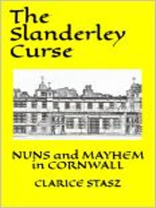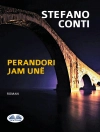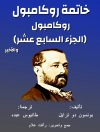‘Beautifully written and impeccably researched, …. the story is certain to captivate fans of both manor fiction and cozy murder mysteries, many of whom will not foresee the villainy that Stasz unveils.’ Kirkus Reviews
Fate sends young Kenal Gundry, who hoped to be a Cornwall fisherman, into service. Though strong and smart, he is also naive and overly pious. At his first placement, a nymphomaniac harasses him. Moving to Slanderley, he finds comfort in its isolated location and several members of the de Loverly family. When unexpected deaths follow, he searches for reasons. ’It be the Nun’s Curse, ‘ argue some. ‘It is just coincidence, ‘ claim others. Kenal himself becomes a murder suspect in one case.
The story is in Kenal’s voice, from a memoir found decades later. Along with the mysteries, he details events familiar to Edwardian estates, such as an automobile rally, a May Day celebration, and Midsummer’s Eve. He meets working artists, a Hungarian wine merchant, and an Oxford archivist. Exposed to new ideas and personalities, he grows to manhood with a broader view of life’s opportunities. His new understanding helps him survive World War I, though not as a combatant. Framing his account are commentaries from an Oxford don, who leaves one wondering about the truth.
A propos de l’auteur
Clarice Stasz has published over forty years, from social commentary to biographies. A retired professor of history, Clarice is a leading scholar of Jack London, with appearances in documentaries for HBO and PBS. She was noted by Book-of-the-Month Club for The Vanderbilt Women, and has received several awards for her Jack London studies. Starting her writing career as an editor, Clarice is committed to crisp and straightforward narratives to introduce average readers to history. A lifelong reader of mysteries, Slanderley is her first venture into the genre, and she is now on her third book in the series!Living close to Jack London State Historic Park, she discovered the author and his times close to her fascination with the Gilded Age and Progressive Era. This led her to the use of biography as a means to convey American history. Her ongoing research was supported in part by the Rockefeller Archives and the National Endowment for the Humanities. Through these writings run the themes of gender, race, and power relations. She wrote the first textbooks incorporating discussion of the male as well as female social roles, this at a time when concentration on women alone prevailed.












